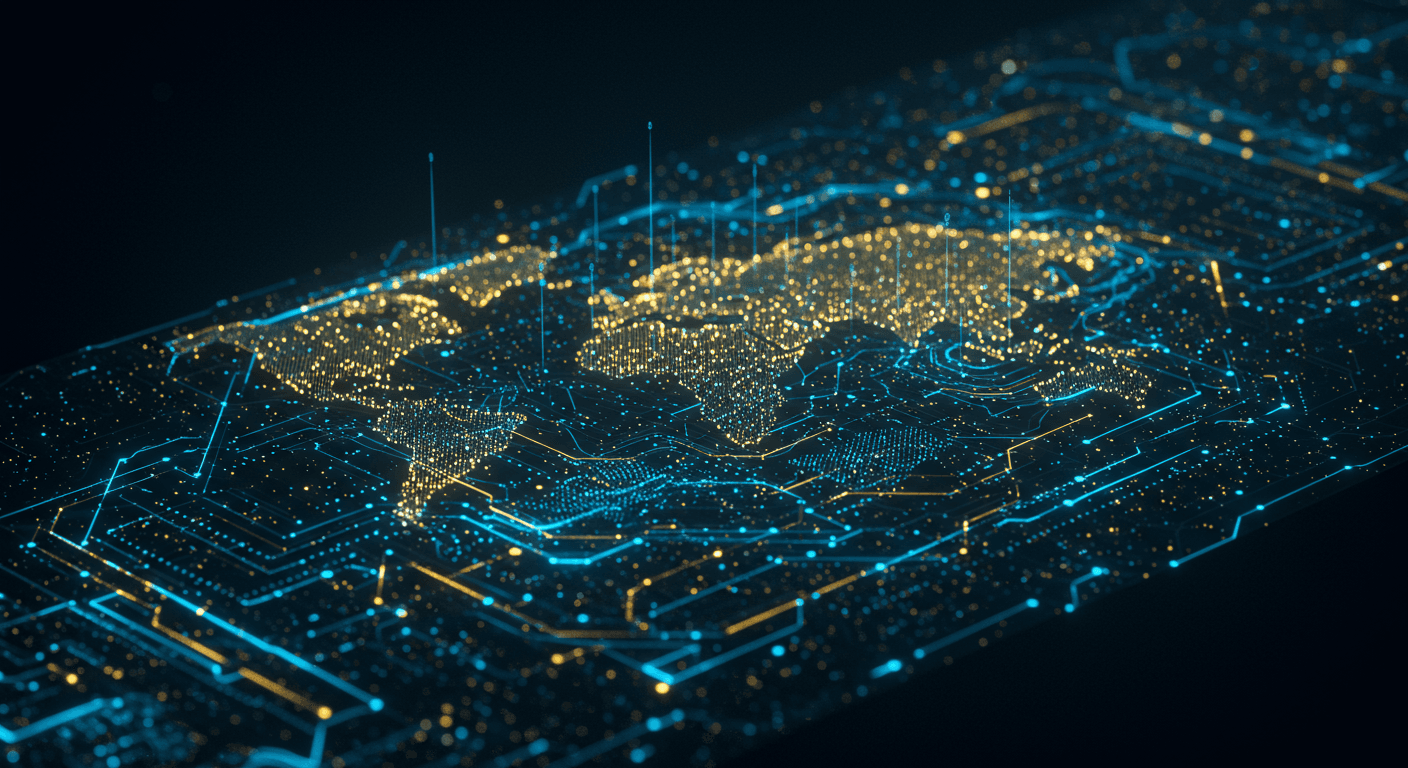Sovereign AI: Charting a Course Through Geopolitical Tides

Here’s to navigating the choppy waters of "Sovereign AI," a term that's as politically charged as it is technologically ambitious.
Decoding Sovereign AI: More Than Just Tech
Sovereign AI isn't just about cool algorithms; it's about autonomy, control, and governing data within a nation's digital borders. Think of it as digital self-determination.
The U.S. vs. China Tech Tango
The escalating tech rivalry between the U.S. and China isn't just about who has the shiniest new gadget; it's a major catalyst for countries to pursue Sovereign AI initiatives. This push to maintain technological advantage is creating a high-stakes environment where AI capabilities are seen as critical national assets.
Beyond Security: Economics and Independence
Sovereign AI goes far beyond national security; it's deeply intertwined with economic implications and the pursuit of technological independence.
Imagine a country aiming to reduce reliance on foreign Software Developer Tools, fostering its own AI ecosystem to drive innovation and growth.
- Economic implications: A country with strong AI can boost its GDP and create high-paying jobs.
- Technological independence: Building domestic AI capabilities lessens reliance on foreign technologies and avoids potential supply chain vulnerabilities.
- Data Governance: With tools like AnythingLLM, organizations are able to control their sensitive data.
Why 'Sovereign AI' is Slippery
While "Sovereign AI" sounds grand, it's a bit of a misnomer. AI development is rarely confined by borders.
To foster a more neutral understanding, framing the discussion with less politically loaded language will prevent misconceptions and focus on the core issues.
In short, Sovereign AI is less about absolute control and more about strategic influence in the AI landscape, a concept as complex as any quantum equation. Next, let's unpack what this means for various industries and global collaboration.
Here's my take:
Navigating the sovereign AI landscape requires a keen understanding of each nation's approach.
The U.S. Perspective: Innovation, Collaboration, and Strategic Alliances
The U.S. approach to AI can be summed up in three words: open, ethical, and collaborative. It is no accident that many of the most popular AI tools originated in the US. ChatGPT is a prime example, offering conversational AI that reshaped user expectations.
Private Sector Leadership & Government Support
The U.S. strategy places strong emphasis on innovation driven by the private sector. This isn't to say that government plays no role; federal funding and initiatives are crucial in supporting AI research, especially at universities and specialized labs. The National Science Foundation, for instance, invests heavily in AI development, fostering the next generation of AI researchers.
Balancing Competition and Cooperation
"In the realm of AI, we must cooperate intelligently and compete strategically."
International collaborations are essential, but the U.S. also recognizes the competitive landscape. Balancing data security and mitigating AI misuse is paramount. Recent U.S. legislation seeks to address these concerns, focusing on AI ethics, data privacy, and algorithmic transparency. Consider exploring the AI Legal implications and standards for more insight on this topic.
Collaboration and Competition in AI Tools
The compare pages help navigate the crowded AI field. For example, DALL-E 3 vs Midjourney highlights different approaches to AI image generation. These comparisons help consumers decide which option is best for their use case.
In short, the U.S. champions a dynamic AI ecosystem – one that fosters innovation through open competition, guides development with ethical considerations, and navigates international partnerships with strategic foresight.
China’s AI aspirations are not just about technological prowess; they're a cornerstone of its strategic vision.
State-Led Development and Data Dominance
China's AI development operates under a state-led master plan, seeking to achieve technological supremacy. This involves:
- Centralized control over resources, ensuring aligned development goals.
- Ambitious goals for AI integration across sectors.
Integration Across Sectors
AI's integration into various sectors in China is broad and impactful:
- Surveillance: AI-powered facial recognition and monitoring systems are prevalent.
- Healthcare: AI aids in diagnostics and personalized medicine.
- Manufacturing: Smart factories leverage AI for automation and optimization.
- Finance: AI drives fraud detection and algorithmic trading.
Ethical Implications and Social Control
The ethical implications of China's AI policies are significant:
- Privacy Concerns: Extensive data collection raises privacy questions for citizens.
- Human Rights Issues: The use of AI in social control mechanisms has sparked international concern.
Technological Advancements
Despite ethical questions, China's AI sector showcases impressive advancements:
- Breakthroughs in facial recognition, natural language processing, and computer vision.
- Leading-edge research in areas like quantum computing and AI chips.
Sovereign AI isn't just about algorithms; it's a tectonic shift redefining the global power balance.
Global Implications: A Shifting Geopolitical Landscape

Sovereign AI, the concept of a nation developing and controlling its own AI capabilities, is rapidly reshaping international relations in ways we've never seen before. Here’s how:
- Trade and Diplomacy: Imagine AI-driven economic modeling predicting trade imbalances before they occur; nations with advanced Sovereign AI can leverage this for more favorable trade agreements.
- Security: Forget conventional warfare – autonomous defense systems powered by AI are the new strategic advantage.
- AI Nationalism: Countries are increasingly prioritizing data privacy and technological autonomy, aiming to protect valuable datasets within their borders. This push is fueled by fears of foreign dependency and security vulnerabilities. For example, governments are using AI for data analytics to identify critical vulnerabilities in their digital infrastructure.
The New AI Arms Race
We're not just talking about self-driving tanks, though those are certainly a part of it. The "AI arms race" involves:
- Investing heavily in AI research and development, including tools for code assistance to accelerate innovation.
- Developing offensive and defensive AI capabilities for cybersecurity.
- Securing access to critical resources, like data and specialized hardware.
Developing Nations: Opportunities and Challenges
Sovereign AI presents both incredible opportunities and significant challenges for developing nations.
- Opportunities: Jumpstarting economic growth, improving healthcare with tools like AI-Tutor for personalized education, and enhancing public services.
- Challenges: Limited access to resources, data, and expertise, potentially widening the digital divide.
Towards Global AI Standards?
While AI nationalism is on the rise, there's growing recognition of the need for global standards and regulations to ensure ethical and responsible AI development. This includes:
- International collaboration on AI safety and security.
- Establishing common frameworks for data privacy and algorithmic transparency.
- Addressing the potential for bias and discrimination in AI systems.
Alright, let's dive into the ethical quicksand – because even the most brilliant AI is only as good as the intentions behind it.
Ethical and Societal Considerations: Navigating the AI Dilemma
We're building minds that can outthink us, but are we building them right?
Responsible AI: It's Not Optional
Imagine an AI judge consistently ruling against a specific demographic. Suddenly, AI ethics isn't just an academic discussion, but a blatant injustice.
- Fairness: AI must be trained on diverse, unbiased data to ensure equitable outcomes. We need to vigilantly guard against perpetuating existing societal inequalities.
- Transparency: Understanding how an AI arrives at a decision is crucial. Black boxes are fine for magic tricks, not for life-altering decisions.
Bias in Algorithms: Eradicating the Glitch in the Machine
Bias creeps in when AI models are trained on skewed or incomplete data, leading to discriminatory results. The Guide to Finding the Best AI Tool Directory can help you navigate the tools landscape and be aware of bias in applications.
- Example: A facial recognition system trained primarily on Caucasian faces might struggle to accurately identify people of color.
- Solution: Rigorous testing and diverse datasets are essential to identify and mitigate bias.
The Future of Work: Adapting to the AI Revolution
AI-driven automation will inevitably lead to job displacement. Ignoring this would be, shall we say, unintelligent.
- Reskilling: Investing in education and training programs to equip workers with the skills needed for the new economy is paramount. We can also use Software Developer Tools to improve workforce's ability to adapt.
- New Economic Models: Exploring alternative economic models, like universal basic income, might become necessary to address widespread job losses.
Data Privacy and Security: Guarding the Digital Soul
AI thrives on data, but that data is often deeply personal.
- Protection: Robust data protection regulations, like GDPR, are crucial to prevent misuse of personal information.
- Security: Preventing data breaches and ensuring the security of AI systems are paramount to maintain public trust.
The Long Game: Autonomy and Social Fabric
What happens when AI surpasses human intelligence? Will we become subservient to our own creations?
- Human Autonomy: Ensuring that humans retain control over decision-making processes is essential to safeguard our autonomy.
- Social Structures: We need to proactively address the potential impact of AI on social structures, values, and human connection.
Hold onto your hats, because the road to Sovereign AI is paved with more than just good intentions—it requires solid tech foundations.
The Technological Building Blocks of Sovereign AI
To truly harness the power of AI within national borders, several technological pillars must be firmly in place. Think of it as building a skyscraper; you can't just slap steel beams together without a blueprint and a strong base.
Data Infrastructure is Key
"Data is the new oil, but only if you can refine it."
- Collection: A robust infrastructure starts with gathering relevant data. This includes everything from government records and scientific datasets to citizen-generated content and IoT sensor streams.
- Storage: Secure, scalable storage is crucial. Think massive data lakes, potentially leveraging decentralized solutions.
- Processing: High-performance computing is required to handle the massive workloads of training and deploying AI models. Could Groq, with its Language Processing Unit (LPU) architecture, offer a solution?
AI Algorithms and Machine Learning
- Algorithmic Advancements: Continuously developing and refining AI algorithms is essential. This includes exploring new architectures like Transformers and pushing the boundaries of unsupervised learning.
- Transfer Learning: Leveraging pre-trained models to accelerate development. This is where open-source initiatives can become invaluable, allowing nations to build upon existing work rather than starting from scratch.
- Consider using the ChatGPT tool to analyze the data that is being collected for trends and better future models. ChatGPT is a powerful conversational AI tool to get a better idea of the data.
AI Hardware: The Physical Backbone
- Specialized Chips: We're not talking about your average desktop CPU. AI demands specialized hardware like GPUs, TPUs, and even neuromorphic chips designed for parallel processing and efficient computation.
- Sensors and IoT: Integrating AI with the physical world requires advanced sensors to collect data and actuators to execute decisions. Imagine smart infrastructure monitoring bridges, analyzing traffic patterns, or optimizing energy grids.
The Importance of Cybersecurity
- Protection from Cyberattacks: Securing AI systems against malicious actors is paramount. This includes robust authentication, intrusion detection, and incident response capabilities.
- Securing sensitive data should be a priority, especially when privacy-conscious users might have some of their data exposed.
- Data Breach Prevention: Protecting data integrity and confidentiality is non-negotiable. Techniques like differential privacy and federated learning can help to safeguard sensitive information.
Integration with Emerging Technologies

- IoT and Edge Computing: Bring AI closer to the data source through edge computing, reducing latency and enhancing real-time decision-making.
- Blockchain: Leveraging blockchain for secure data sharing, verifiable AI models, and transparent governance.
- Quantum Computing: Although still in its infancy, quantum computing could revolutionize AI by enabling the training of exponentially more complex models.
Sure, here's the raw Markdown content:
Future Trends: What Lies Ahead for Sovereign AI?
The future of Sovereign AI isn't about robots ruling the world, but rather a recalibration of power in the digital age.
The Evolution of AI Regulation
Expect a dynamic dance between fostering innovation and mitigating risks. We're talking agile frameworks, not static laws. Think of it like open-source software development: iterations and community feedback constantly refining the code. Regulatory sandboxes are likely, allowing experimentation before broad deployment. This approach is covered in our Learn section, giving actionable insights on navigating the legal landscape.The Increasing Importance of AI Ethics
Ethical AI isn't just a buzzword; it's becoming a business imperative.Imagine explaining your AI's decisions to a jury – can you do it honestly and transparently?
- Expect standardized ethical frameworks and guidelines to emerge, influencing everything from algorithmic design to data governance.
- AI tools, such as ChatGPT, are already being scrutinized for their ethical implications. This conversational AI has shown the power of Large Language Models, and the responsible development around these tools remains paramount.
The Rise of Decentralized AI
Power to the people! Decentralized AI is about empowering individuals and communities with AI tools that aren't controlled by centralized entities. This could mean:- AI models running on edge devices, like your phone or a local server.
- Blockchain-based AI marketplaces.
AI to Address Global Challenges
AI’s ability to crunch vast datasets offers unprecedented opportunities to tackle climate change, improve healthcare outcomes, and alleviate poverty. Imagine AI-powered climate models predicting extreme weather events with pinpoint accuracy or AI-driven diagnostic tools making healthcare more accessible in remote areas. Scientists are increasingly reliant on Scientific Research AI Tools to find solutions.The Future of Human-AI Collaboration
It's not humans vs. AI, but humans with AI. Picture this: Human: Sets the strategic vision and provides ethical oversight. AI: Handles data analysis, automates tasks, and generates creative content. Consider exploring AI prompts to unlock this potential.Sovereign AI will redefine how we interact with technology, govern ourselves, and solve global challenges, emphasizing the importance of responsible development, ethical frameworks, and collaborative partnerships.
Keywords
Sovereign AI, AI geopolitics, US-China tech war, AI regulation, AI ethics, national AI strategy, AI development, AI governance, AI nationalism, data sovereignty, artificial intelligence, China AI, United States AI, AI technology, AI competition
Hashtags
#SovereignAI #AIPolitics #TechWar #AIethics #ArtificialIntelligence
Recommended AI tools
ChatGPT
Conversational AI
AI research, productivity, and conversation—smarter thinking, deeper insights.
Sora
Video Generation
Create stunning, realistic videos & audio from text, images, or video—remix and collaborate with Sora 2, OpenAI’s advanced generative app.
Google Gemini
Conversational AI
Your everyday Google AI assistant for creativity, research, and productivity
Perplexity
Search & Discovery
Clear answers from reliable sources, powered by AI.
Cursor
Code Assistance
The AI code editor that understands your entire codebase
DeepSeek
Conversational AI
Efficient open-weight AI models for advanced reasoning and research
About the Author

Written by
Dr. William Bobos
Dr. William Bobos (known as 'Dr. Bob') is a long-time AI expert focused on practical evaluations of AI tools and frameworks. He frequently tests new releases, reads academic papers, and tracks industry news to translate breakthroughs into real-world use. At Best AI Tools, he curates clear, actionable insights for builders, researchers, and decision-makers.
More from Dr.Was this article helpful?
Found outdated info or have suggestions? Let us know!


